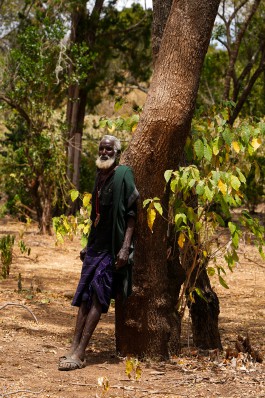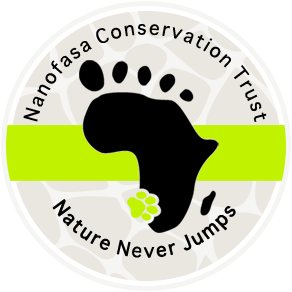


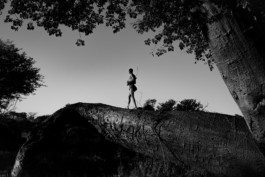
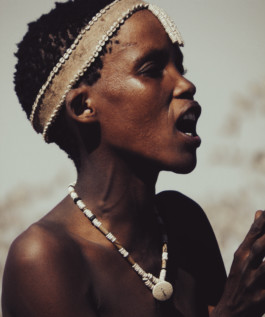
NANOFASA is dedicated to the awakening and revival of creativity as a catalyst for positive change. We wish to empower indigenous culture and heal nature through creativity and innovation.
Nanofasa is a non-profit trust committed to protecting and sustaining the cultural and natural integrity of indigenous peoples. Our mission is to give them a platform to cultivate solutions for their future and the future of our planet.
We believe that by blending indigenous knowledge and wisdom with creativity and innovation, we can protect biodiversity for culture and nature while ensuring sustainability for our planet's future. Our approach, Nanofasa Indigenous Innovation, harmonizes ancient wisdom with creativity to find solutions for our planet and its guardians. We empower communities by preserving traditional knowledge, creating job opportunities, and fostering sustainable development. This unique model ensures that cultural heritage and the environment can coexist and thrive for the benefit of present and future generations.
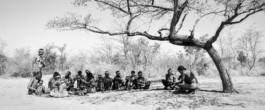
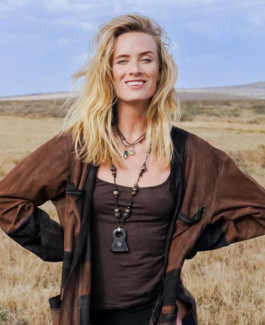
Aleksandra Orbeck is a visionary CEO, activist, and artist with a passion for creating positive change in the world. With a background in acting and filmmaking, Aleks has dedicated her life to protecting wildlife and indigenous peoples in Africa, as well as promoting environmental sustainability.
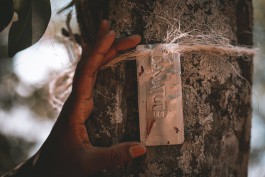


NANOFASA is dedicated to the awakening and revival of creativity as a catalyst for positive change. We wish to empower indigenous culture and heal nature through creativity and innovation.
Nanofasa is a non-profit trust committed to protecting and sustaining the cultural and natural integrity of indigenous peoples. Our mission is to give them a platform to cultivate solutions for their future and the future of our planet.
We believe that by blending indigenous knowledge and wisdom with creativity and innovation, we can protect biodiversity for culture and nature while ensuring sustainability for our planet's future. Our approach, Nanofasa Indigenous Innovation, harmonizes ancient wisdom with creativity to find solutions for our planet and its guardians. We empower communities by preserving traditional knowledge, creating job opportunities, and fostering sustainable development. This unique model ensures that cultural heritage and the environment can coexist and thrive for the benefit of present and future generations.

Aleksandra Orbeck is a visionary CEO, activist, and artist with a passion for creating positive change in the world. With a background in acting and filmmaking, Aleks has dedicated her life to protecting wildlife and indigenous peoples in Africa, as well as promoting environmental sustainability.


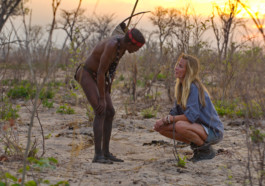
Model, actress, author and earth activist. Aleksandra Ørbeck-Nilssen has worked with conservation in the north east of Namibia, fought farmers to protect wildlife, lived in deep loneliness far out in the bush, walked 1490 km across Namibia, and worked side by side with one of the world's oldest indigenous peoples - the San people in Namibia, for ten years.
When Aleksandra was 15, she moved alone to Paris and NYC to work as a modelShe landed campaigns for clothes and shoes and many well-known magazines. But life in New York was not enough, Aleksandra wanted something more, at the age of 18, she went to Namibia to work as a volunteer with wild animals. At 20, she started the organization Nanofasa in Namibia with the San people. The San people today are one of the poorest and most marginalized people in the world.
"What governments are doing to indigenous peoples today is a passive genocide!
There are two ways to kill, one can actively kill people, or watch them die. It qualifies for the same.
Aleksandra believes that indigenous peoples are our best allies in the work of safeguarding the planet, and therefore she is working to find new innovative ways to protect nature by using ancient knowledge.
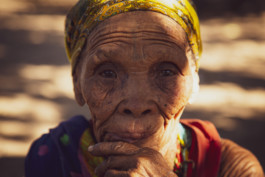
Our unwavering commitment to language revival extends beyond the preservation of spoken words alone. It encompasses the digitization of the Yaaku language and the creation of a unique repository of wisdom—a "Bush Encyclopedia" that transcends the boundaries of Yaakunte to embrace other endangered languages and ecosystems. In our quest to safeguard this linguistic treasure trove, we employ a multifaceted approach.
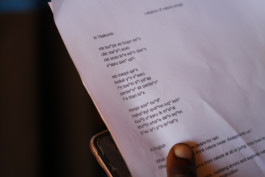
At the heart of this initiative lies the meticulous preservation of oral tradition. Traditional stories, songs, and the invaluable oral history of the Yaaku people are recorded with meticulous care and safeguarded for posterity. This meticulous process ensures that these cultural treasures remain accessible to future generations.
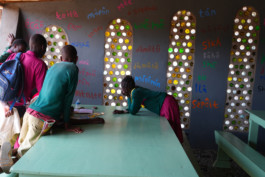
Songs and games in the Yaaku language emerge as potent tools for cultural expression and revitalization. They breathe life into the language, fostering a profound sense of identity and pride within the community. The rhythms of ancient songs and the spirit of traditional games echo through generations, connecting the past, present, and future.
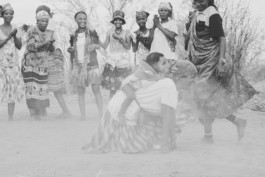
In the realm of dying languages, we unlock the voices of the past. These languages tell the untold stories of those who have been long forgotten. The custodians of our last wilderness areas, these forgotten people protect the very essence of our planet's most pristine landscapes.
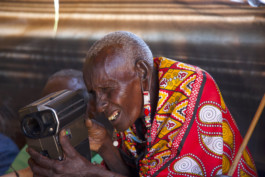
BUSH TV
As part of our preservation efforts, we engage in wisdom interviews with elders from various tribes. These interviews transcend language, offering profound insights into the wealth of indigenous wisdom. But we aspire for more—a 360-video and standard video platform called "BUSH TV." This innovative platform will enable elders and young poeple to share their wisdom with the world, speaking of love, happiness, fear, life, death, and the untold stories of the forgotten people who safeguard our last wilderness areas. Through these efforts, we aim to create a "Bush Encyclopedia" filled with timeless wisdom and stories that have the power to cure the poverty of the heart and transport people to places where the Wi-Fi is weak, but the connection is strong.
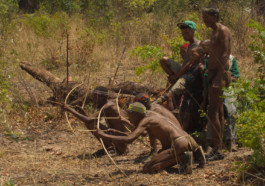
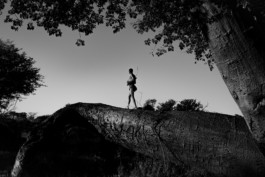
Nanofasa operates within the traditional homeland of the Ju/’hoan San, also commonly known as Bushmen in Namibia. This remarkable group holds the distinction of being considered the world's oldest culture, with a lineage that dates back to the very origins of hunting and gathering societies. Despite this rich heritage, the San community now grapples with extreme poverty, driven in large part by their forced displacement from their ancestral lands. Tragically, these lands are increasingly encroached upon for illegal cattle grazing, leaving the San people struggling to maintain their traditional way of life.
The San community represents one of the most marginalized and vulnerable groups in Southern Africa. The challenges they face are multifaceted. Food security is alarmingly low, with many San families struggling to access adequate nutrition. Educational opportunities are limited, and few San learners are able to complete their basic education. Illiteracy rates are high, and unemployment is a pervasive issue.
Within an expansive area of 9000 square kilometers, approximately 2300 Ju/‘hoansi San individuals reside, and a significant proportion of this population comprises children who, without intervention, face an uncertain future. Their prospects are starkly limited by circumstances beyond their control.
The health status of the San community is undeniably linked to their low socioeconomic status. Tragically, San life expectancy is a staggering 22% lower than the national average, standing at a mere 48 years. These sobering facts underscore the urgent need for comprehensive support and empowerment initiatives, like those championed by Nanofasa, to uplift the Ju/’hoan San community and create a path towards a more equitable and sustainable future.
The Yaaku, also known as the Mukogodo, are an indigenous ethnic group living in Kenya, primarily in the Laikipia County region. They are one of the smallest and most marginalized indigenous communities in Kenya. The historical background of the Yaaku is characterized by their unique culture, deep connection to the forest, and the tragic loss of their language.
Arrival and History:
The Yaaku are believed to be descendants of the Ogiek, who are traditionally hunter-gatherers. They are believed to have migrated to Kenya from the Great Lakes region and settled in the Mukogodo Forest area. Over centuries, the Yaaku developed a distinctive way of life deeply connected to the forest, with hunting and gathering being central to their subsistence.
Culture:
The Yaaku culture is rich and deeply tied to the natural world. Their traditional way of life revolves around hunting and gathering, and they have an intricate knowledge of the Mukogodo Forest's flora and fauna. They are known for their unique skills in honey harvesting, weaving, and traditional herbal medicine.
Connection to the Forest:
The Mukogodo Forest is not just a geographical location for the Yaaku; it's their spiritual and cultural heartland. They have a profound connection to this forest, which is one of the few remaining dry forests in Kenya. It's a vital site for biodiversity, wildlife corridors, and cultural identity for the Yaaku people. The forest provides them with essential resources for their traditional way of life, including food, medicine, and materials for crafting.
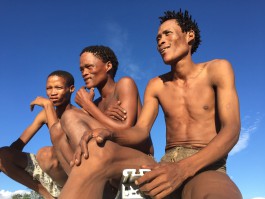
In the heart of indigenous communities, an age-old wisdom echoes, "If you give a man a fish, he will eat today; if you teach him how to fish, he will never be hungry." Yet, among these communities, like the resilient San people, entrepreneurship isn't just a concept—it's a way of life, an age-old startup. Each individual becomes an expert in their right, thriving through hunting, gathering, and nurturing their environment.
At Nanofasa Indigenous Innovation, we stand firmly on the belief that the most sustainable aid empowers people to help themselves and nurture their surroundings.
Our mission is clear: bridge the ancient wisdom with modern solutions.
Our goals are a testament to this commitment:
Education and Work Creation:
We preserve traditional knowledge while creating employment opportunities across multiple communities.
Ownership and Local Engagement:
We foster a sense of ownership and active involvement within local communities.
Community Resilience and Cultural Pride:
Our work stimulates community resilience and celebrates cultural pride.
Preserving Traditions:
We dedicate ourselves to preserving the social and cultural practices of indigenous communities.
Positive Socio-Economic Growth:
Through Indigenous Innovation Social Impact Businesses, we strive for positive socio-economic growth in the regions we operate.
Resource Management and Sustainability:
We activate community awareness regarding resource management and nature sustainability.
Our approach breathes new life into ancient wisdom, transforming age-old practices into creative business solutions. These solutions not only benefit the people but also ensure the survival of their surrounding nature. It's an ancient-rooted business model born from a profound respect for the environment and cultural heritage.
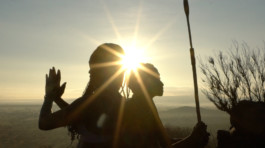
Picture businesses that serve as guardians of the environment, where each step forward aligns with ecosystems that have sustained communities for centuries. It's a return to the roots, where the well-being of people and the health of the environment are intertwined.
Our commitment is to infuse new life into these age-old practices, watching as they grow into businesses that provide for communities, celebrate cultural heritage, and protect the delicate balance of nature. It's a revival, a reconnection, and a promise of a sustainable tomorrow.
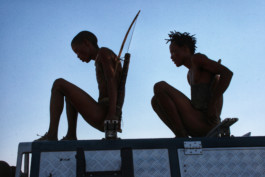
Embedded within our project is a commitment to indigenous innovation. Beekeeping becomes a catalyst for sustainability. Sustainable honey production, the warmth of beeswax candles, and more are not just commodities; they are sources of income for the Yaaku people. Young single mothers bead the decorations for these objects, and this initiative protects wild bee populations.
By empowering indigenous women and men to become protectors of wild bees, we tap into the rich knowledge and traditions of the world's first beekeepers. By cultivating their lives and supporting their efforts, we promote sustainable beekeeping practices that not only enhance bee populations, but also strengthen local ecosystems and promote biodiversity. Through our work, we can inspire a new generation of beekeepers and pollinators who will help to create a more sustainable future for us all. We honour the deep connection between indigenous communities and wild bees by empowering indigenous women and men to become guardians and protectors of bee diversity in Africa and beyond. Through education, training, and access to resources, we support the preservation of bee populations and their ecosystems in areas that are traditionally protected by indigenous communities, which are often home to the world's most diverse bee species. By working together with indigenous communities, we can develop sustainable and culturally sensitive practices that promote long-term wild bee conservation efforts while improving the livelihoods of those involved.
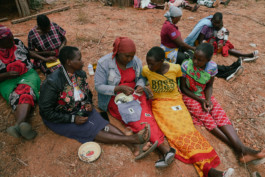
Expected Outcomes:
• Increased knowledge and skills in sustainable beekeeping practices among indigenous people.
• Creation of new beekeeping businesses and income-generating opportunities for indigenous peoples.
• Improved health of local ecosystems through the conservation of wild bee populations and their habitats.
• Greater public awareness and engagement on the importance of bees in sustaining life on our planet.
• Strengthened appreciation and understanding of indigenous culture and their important role in protecting our planet.
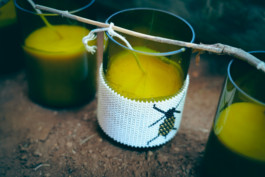
Another vital role is played by our tree shepherds. While currently focused on nurturing the Word Forest nursery and tree kindergarten, these guardians of the forest will evolve into a tree shepherd team—an anti-poaching unit dedicated to protecting and researching reintroduced trees and ancient mother trees. They report on tree and wildlife conflicts, monitor trees targeted for illegal logging, and explore innovative methods like land art to deter elephants and humans from harming specific trees.
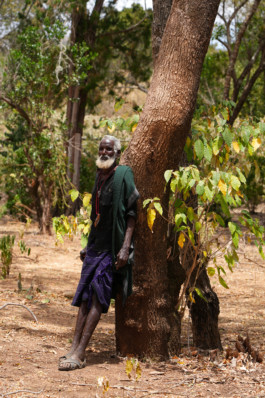
Our upcycling artisans form a distinct group of individuals. They are passionate about transforming discarded materials into treasures. Their creative endeavors address the pressing issue of clothing waste dumped in Kenya from the West and other waste materials.
Through upcycling, they breathe new life into these materials while creating economic opportunities that support our vision.
These practices seamlessly harmonize environmental conservation with the preservation of cultural heritage, emphasizing a holistic approach to sustainability. The revenue generated contributes to language education, cultural preservation, and the creation of digital resources. A thriving bee population isn't just about honey; it enhances tree planting efforts, fostering a harmonious cycle of reforestation and pollination.
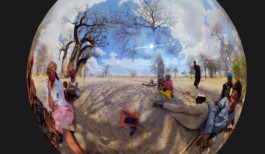

In a collaborative effort with Kenya's Yaaku people, Nanofasa has initiated the Word Forest Project—an urgent response to safeguard a tribe once on the precipice of extinction. These are a forgotten people, guardians of a dying language, warriors fighting to ensure their ancestral home survives the threats of illegal logging.
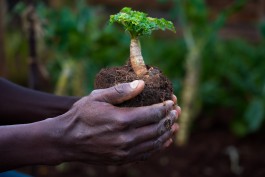
Nestled in central Laikipia County's Mukogodo Forest, the Word Forest takes shape. We're not just planting trees; we're weaving a living Yaakunte dictionary by carefully attaching Yaakunte words to tree-friendly tags. This connection between culture and nature breathes life into a heritage on the brink.
But our vision extends beyond reforestation. We aim to cultivate a collective effort—a harmonious blend of language revival and forest preservation. For every tree planted, a word is tagged and saved, preserving culture, stories, wisdom, and a sense of belonging. This is about cultivating hope for our planet's future.
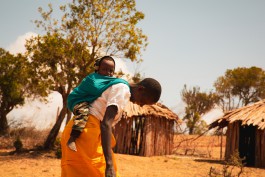
The Mukogodo Forest is among Kenya's few remaining dry forests—a sanctuary under the guardianship of the Yaaku people. It's crucial for biodiversity, wildlife corridors, and cultural identity, yet it faces imminent peril.
In this critical moment, Nanofasa stands with the Yaaku people to defend this unique forest and language. Together, we defy the odds, breathe life into fading cultural identity, and ignite hope for our planet's future. Our mission is clear—to preserve, protect, and promote sustainable development in this sanctuary of culture, language, and nature.
